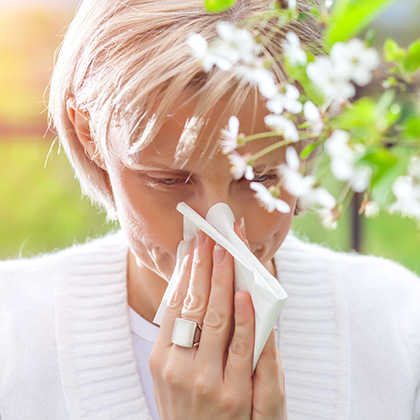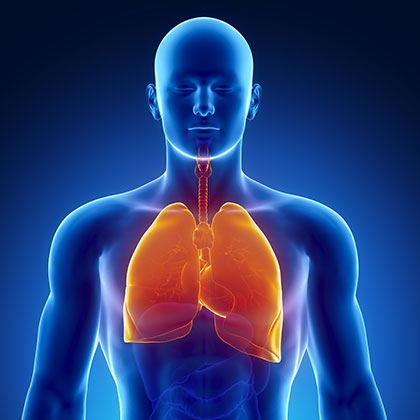If your sinuses are infected by a virus or bacteria, the result is inflammation – which is also called sinusitis. But what are the sinuses and what purpose do they have? The sinuses are small cavities found in the skull, specifically inside the cheekbones and forehead. There are four cavities altogether:
-
The maxillary sinuses are the largest, measuring around an inch in width (these are found in the cheekbones and are the sinuses most commonly affected by sinusitis).
-
The frontal sinuses are in the lower part of the centre of the forehead (the frontal sinuses are the second largest cavities).
-
The ethmoid sinuses are situated between the eyes at the bridge of the nose.
-
The sphenoid sinuses are in bones behind the nasal cavity.
What do they do?
The sinuses are lined with mucosa, which is a soft pink tissue, similar to that which lines the inside of the nose. Connected to the nose via smaller openings called ostia, they are thought to help humidify the air we breathe before it gets to the lungs – though this is just a theory, as many believe the purpose of our sinuses isn’t that clear.
We do know, however, that sinuses produce mucous secretions that drain into the nose, where they filter out dust, bacteria and other pollutants. In fact, you may be surprised to learn that the nose and sinuses are thought to produce around a pint and a half of mucous secretions every day (i) – but you probably won’t be aware of it, as this is a normal bodily function.
However, when the sinus linings become swollen as a result of inflammation, it blocks the passage of mucous from the sinuses to the nose, which can make it hard for you to breathe clearly. Other symptoms of sinusitis include a thick green or yellow discharge from your nose; a dull, throbbing pain in the top part of your face (also called a sinus headache) or a feeling of pressure around the area of your cheeks, eyes or forehead; toothache; bad breath; reduced sense of smell; a high temperature and post-nasal drip (nasal fluid releasing into the back of the throat).
There are two types of sinusitis:
-
Acute sinusitis
This may cause mild to severe symptoms, often similar to those of the common cold, which usually lasts for up to three weeks (though sometimes the symptoms can last. According to the National Institute for Health and Care Excellence (NICE), acute sinusitis affects up to 15 per cent of adults (children are less likely to have sinusitis because their sinuses are not fully developed) (ii). -
Chronic sinusitis
This is sinusitis that becomes persistent and lasts for longer than 12 weeks. It’s also common, and is thought to affect one in 10 UK adults (ii).
Causes of sinusitis
Sinusitis can be caused by several things, including the following:
Infections
Acute sinusitis often follows a cold or flu when the virus that causes the cold or flu spreads through the upper airways into the sinuses (viral sinus infection). According to Patient, a small number of cases are also caused by bacteria infecting the sinuses (bacterial sinus infection) (iii). Bacterial sinus infections often last longer than the viral type, and the symptoms may be more severe too. You’ll know your sinuses have become infected when you have a cold or flu, because the discharge from your nose will turn from clear and thin to thicker and yellow or green.
Allergies
If you have allergies that cause inflammation inside the nose, it can block the drainage channels between the nose and the sinuses. This makes the sinuses susceptible to becoming infected because the mucous produced by the mucosa in the sinuses can build up. Related allergies include allergic rhinitis (including hay fever) and asthma.
In some cases, an infection from a tooth can spread to the maxillary sinus (that is, the large sinus cavities in the cheekbones).
Irritants
If you’re sensitive to things like air pollution, cigarette smoke and chemicals found in household cleaning products and other similar products, it can cause inflammation inside the nasal cavity, which can also block the drainage channels between the nose and the sinuses.
Obstructions
Structural problems in the nasal cavity can block or narrow the passages between the nose and sinuses too, including growths called nasal polyps as well as congenital abnormalities in children. A deviated nasal septum (where the wall between the nostrils becomes crooked) can also restrict or block the nose-to-sinus passages.
Sinusitis may also be likely to develop in some people more than others, including those with asthma, cystic fibrosis or an inflammatory disorder such as Wegener’s granulomatosis or sarcoidosis; those who have suffered a trauma or injury to the face (such as a fractured facial bone): and people who have a weakened immune system (including those who are having chemotherapy treatment or who have an immune disorder such as HIV).
Pregnancy may also make you more likely to suffer from nasal inflammation, which can lead to sinusitis. Chronic sinusitis is also linked with diabetes, Kartagener’s syndrome and sniffing illegal recreational drugs such as cocaine.
Sinusitis treatments
If you have sinusitis following a cold (acute sinusitis), it should clear up on its own without any treatment. But if your symptoms don’t improve – or you have chronic sinusitis – you may need to see your GP. According to the NHS, you should see a doctor if your symptoms don’t start to improve after a week, or if your symptoms are severe or getting worse (iv). The treatments you may be recommended to use include the following:
-
Antibiotics
Most cases of acute sinusitis are caused by a viral infection. But if your GP suspects your sinusitis is the result of a bacterial infection, you may be prescribed a course of antibiotic tablets. This is because antibiotics kill bacteria, but they are ineffective against viruses. If you’ve been prescribed antibiotics you may need to take them for a week or longer. There are, however, some possible side effects associated with taking antibiotics, including nausea, vomiting, diarrhoea, skin rashes, fungal infections (such as thrush) and stomach pain. -
Corticosteroids
Steroid sprays and drops are often used to treat persistent sinusitis as they may help to reduce inflammation in the sinuses. You may need to use a steroid spray or drops for three months or longer, and the possible side effects include a sore throat, irritation in your nasal passages and nosebleeds. Your GP may also prescribe steroid tablets rather than a spray or drops, especially if your symptoms are severe.
If you’ve tried corticosteroids and/or antibiotics, and your symptoms don’t improve, you may be referred to an ENT (ear, nose and throat) specialist for surgery. The most common type of surgery used for chronic sinusitis is called functional endoscopic sinus surgery (FESS). This is usually performed under general anaesthetic, and includes a thin tube called an endoscope being inserted into your nose. The end of the tube that goes into your nose has a lens that helps the surgeon to look at your sinuses and to remove any tissue that’s blocking them.
Another option is that a tiny balloon is placed into your sinuses’ drainage passages to widen them (a procedure called balloon catheter dilation or balloon sinuplasty). Once the sinus drainage channel has been widened, the balloon is removed and the sinus is allowed to drain.
If you have nasal polyps or other structural problems inside the nose (such as a deviated septum), you may also need surgery to correct them.
Self-help for sinusitis
If you have acute sinusitis, there are several things you can do yourself to relieve your symptoms:
Pain relief: Taking simple over-the-counter painkillers such as paracetamol and ibuprofen may help to relieve the pain of sinusitis, as well as a high temperature. You may also want to try applying a warm pack to your face, as this can help with pain as well as make it easier for your sinuses to drain.
Breathe more freely: If you have a blocked nose you could also try using over-the-counter decongestant nasal sprays or drops. These can help you to breathe more easily in the short term, but they don’t cure the underlying cause of your sinusitis. Also be careful not to use decongestant nasal sprays or drops for longer than a week at a time, as if used for longer periods they can make your symptoms worse.
Clean your nasal passages
Rinsing your nose with saline nasal drops or a nasal rinse can help unblock your nasal passages by removing mucous. There are several nasal rinse/wash products you can buy, or you could make your own. The following home remedy is recommended by the NHS (v):
-
Mix up a saline solution by mixing a teaspoon of salt and a teaspoon of bicarbonate of soda in a pint of boiling water that has been left to cool.
-
Now rinse your nose one nostril at a time. Stand over a sink and pour some of the saline solution into your cupped hand, sniffing the water into each nostril separately.
-
Repeat until your nose feels more comfortable. If you need to rinse your nose again, you can use the same solution if it has been made during the same day (make a fresh batch of the solution each day, don’t use any that’s more than a day old).
Drink plenty of fluid
Make sure you don’t become dehydrated, as this can make your sinuses worse. Have plenty of drinks, especially water.
Eat healthily
Many nutritional experts believe eating a healthy diet rich in fruit and vegetables can be beneficial if you have sinusitis. Certain foods are also thought to help break up mucous and relieve congestion, so consider adding ingredients such as ginger, garlic, horseradish and chillies to your meals.
Avoid smoke and other irritants
Nasal irritants such as cigarette smoke and chemicals from household sprays can aggravate sinusitis symptoms, so avoid them wherever possible, especially if you’re sensitive to them. If you’re a smoker, consider giving up and look into the various forms of stop-smoking help that’s available, such as patches, gum and lozenges that may help with nicotine cravings. Find out more about our tips to stop smoking.
Natural remedies for sinusitis
Even a mild case of sinusitis can make you feel rotten. Thankfully, there are some natural supplements that may help relieve your symptoms by providing immune support and easing inflammation:
Vitamins C and D
Vitamin C (vi) and vitamin D (vii) may help to improve your immune function, which may be particularly helpful if you have chronic sinusitis as a result of having a weakened immune system
The recommended form of vitamin D is vitamin D3 or cholecalciferol, as it’s the natural form of vitamin D that the body makes when it’s exposed to sunlight. Vitamin D3 supplements are available in tablet form, and now you can get them in veggie-friendly drops too.
However most vitamin D3 supplements are made from the fat of lamb’s wool, which means they’re unsuitable for vegans. The good news is that vegan vitamin D3 supplements sourced from lichen are now more widely available.
Zinc
The mineral zinc is also thought to be important for immune function (viii), with one report suggesting both vitamin C and zinc help to relieve the symptoms of respiratory tract infections as well as shorten their duration (ix).
Multivitamins
One way to get the required level of all three nutrients is to take a high-strength multivitamin and mineral supplement.
Elderberry
Another supplement that may be useful for immune health is elderberry extract, thanks to the fact it contains powerful antioxidants called anthocyanins.
There is also evidence to suggest that black elderberry extract may increase the body’s production of chemical messengers within the immune system called cytokines, suggesting it has an immune-enhancing function (x).
Fish Oils
Since inflammation of the sinuses causes sinusitis, nutritional supplements that reduce inflammation may be helpful. The omega-3 fatty acids eicosapentaenoic acid (EPA) and docosahexaenoic acid (DHA) found in oily fish are widely accepted to have an anti-inflammatory action, with experts writing in the Journal of the American College of Nutrition suggesting omega-3 fatty acids have anti-inflammatory properties and therefore might be useful in the management of inflammatory diseases (xi).
If you’re not keen on eating oily fish such as salmon, herring, mackerel and sardines, you can get an adequate intake of EPA and DHA by taking a good-quality fish oil supplement. However if you’re a vegetarian or vegan you can still benefit from an omega-3 supplement, thanks to the availability of products that contain the natural triglyceride (TG) form of omega-3. This is sourced from plant organisms called microalgae rather than fish oils.
PEA
Another nutritional supplement that may help relieve inflammation as well as the pain that comes with it is PEA. Also known as palmitoylethanolamide, PEA is a type of fatty acid made naturally by the body and found in all cells, tissues and fluids including the brain (it’s also found in foods such as soya beans, peanuts, eggs, flaxseed and milk). Described as an endocannbinoid-like chemical that belongs to a family of fatty acid compounds called amides (xii), PEA is an alternative to CBD, since both substances are thought to have similar properties including the ability to reduce pain and inflammation. However researchers suggest PEA is safer than CBD, since it has been studied more extensively and has a more robust safety profile (xiii) with no known side effects (xii).
Your body naturally increases its production of PEA when your cells are damaged or threatened. But in certain situations – such as when your body is experiencing chronic inflammation – the level of PEA in your cells drops (xii). When this happens, PEA supplements may be helpful. A review of 16 clinical trials and meta-analysis of PEA confirms PEA has analgesic actions – in other words it helps to relieve pain (xiv).
Managing sinusitis can seem daunting, but following the steps above should help to ease some symptoms. For even more information on a range of other health conditions, visit our health library.
References:
-
Available online: http://www.newcastle-hospitals.org.uk/services/ent_treatment-and-medication_sinusitis.aspx
-
Available online: https://cks.nice.org.uk/sinusitis#!backgroundSub:2
-
Available online: https://patient.info/ears-nose-throat-mouth/acute-sinusitis/chronic-sinusitis
-
Available online: https://www.nhs.uk/conditions/sinusitis-sinus-infection/
-
Available online: https://www.nhsinform.scot/illnesses-and-conditions/ears-nose-and-throat/sinusitis#treating-sinusitis
-
Carr. AC., Maggini S., Vitamin C and Immune Function. Nutrients. 2017 Nov 3;9(11) pii: E1211. Available online: https://www.ncbi.nlm.nih.gov/pubmed/29099763
-
Aranow. C. Vitamin D and the Immune System. J Investig Med. 2011 Aug; 59(6):881-886.
-
Chandra. RK. Trace element regulation of immunity and infection. J Am Coll Nutr. 1985;4:5-16.
-
Fraker. PJ, Gershwin. ME, Good. RA, et al. Interrelationships between zinc and immune function. Fed Proc. 1986;45:1474-1479.
-
Wintergerst. ES, Maggini. S, Hornig. DH, et al. . Immune-enhancing role of vitamin C and zinc and affect on clinical conditions. Ann Nutr Metab. 2006;50(2):85-94.
-
Barak. V, Halerpin. T, Kalickman. I, et al. The effect of Sambucol, a black elderberry-based, natural product, on the production of human cytokines: I. Inflammatory cytokines. Eur Cytokine Netw. 2001 Apr-Jun;12(2):290-6.
-
Simopoulos. AP. Omega-3 fatty acids in inflammation and autoimmune diseases. J Am Coll Nutr. 2002 Dec;21(6):495-505.
-
Clayton P. et al., Palmitoylethanolamide: A Natural Compound for Health Management. Int J Mol Sci. 2021 May;22(10): 5305. Available online: https://www.ncbi.nlm.nih.gov/pmc/articles/PMC8157570/
-
Clayton P. et al., Palmitoylethanolamide: A Potential Alternative to Cannabidiol. J Diet Suppl. 2021 Nov;28;1-26. Available online: https://www.tandfonline.com/doi/full/10.1080/19390211.2021.2005733
-
Gabrielsson . L, Mattsson. S, Fowler. CJ. Palmitoylethanolamide for the treatment of pain: pharmacokinetics, safety and efficacy. Br J Clin Pharmacol. 2003;110:359-362.Available online: https://www.ncbi.nlm.nih.gov/pmc/articles/PMC5094513/
Related Posts
Disclaimer: The information presented by Nature's Best is for informational purposes only. It is based on scientific studies (human, animal, or in vitro), clinical experience, or traditional usage as cited in each article. The results reported may not necessarily occur in all individuals. Self-treatment is not recommended for life-threatening conditions that require medical treatment under a doctor's care. For many of the conditions discussed, treatment with prescription or over the counter medication is also available. Consult your doctor, practitioner, and/or pharmacist for any health problem and before using any supplements or before making any changes in prescribed medications.

Christine
Christine Morgan has been a freelance health and wellbeing journalist for almost 20 years, having written for numerous publications including the Daily Mirror, S Magazine, Top Sante, Healthy, Woman & Home, Zest, Allergy, Healthy Times and Pregnancy & Birth; she has also edited several titles such as Women’ Health, Shine’s Real Health & Beauty and All About Health.
View More



